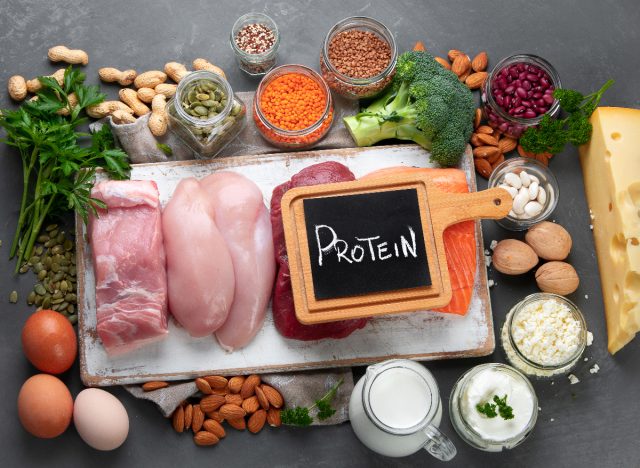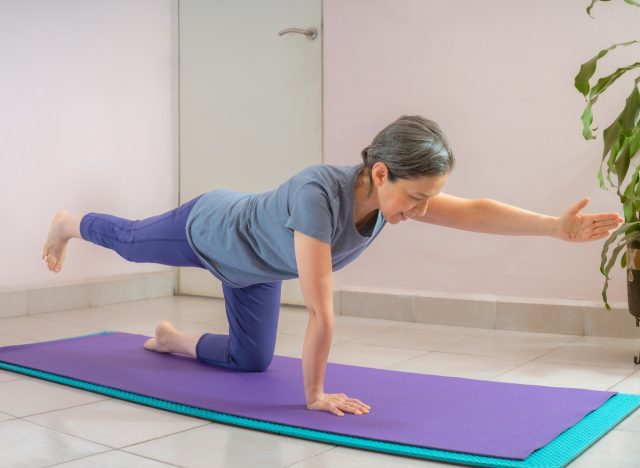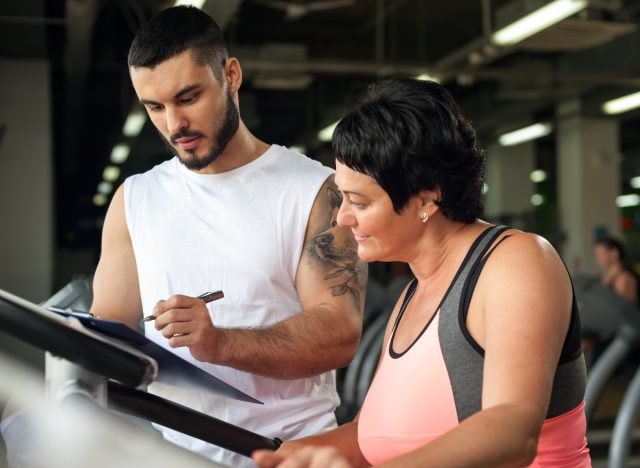Share this @internewscast.com
As you age, maintaining muscle mass and strength becomes increasingly important for your overall health, well-being, and quality of life. After hitting your 40s and 50s, hormonal changes and decreased physical activity can lead to muscle loss, which can contribute to a range of health issues. The good news is that with the right approach to your diet and fitness routine, it’s possible to prevent and even reverse muscle loss. We did the hard work for you and rounded up some of the best fitness tips for women to prevent muscle loss. All you have to do is start implementing these habits into your daily life!
If you’re eager to find out how to maintain and build up your muscle strength for a healthier, more active life, it’s time to listen up. Keep reading to learn all about our top fitness tips for women to prevent muscle loss. And when you’re finished, be sure to check out the 10 Best Strength Exercises for Women To Melt ‘Middle-Aged Spread’ Belly Fat.

One of the most effective ways to combat muscle loss is through strength training exercises. Incorporating weight lifting or resistance training into your fitness routine helps stimulate muscle growth, increase bone density, and improve metabolism. Start with light weights, and gradually increase the intensity as you build strength. Focus on compound exercises that target multiple muscle groups, such as squats, deadlifts, and bench presses, to get the best results.

Protein is essential for muscle repair and growth. As you age, your body may require more protein to maintain muscle mass. Aim to include lean sources of protein in every meal, such as chicken, fish, lean beef, tofu, beans, and low-fat dairy products. Consider consulting with a nutritionist to determine your specific protein needs based on your age, activity level, and overall health.

Proper hydration is often overlooked but crucial for muscle health. Dehydration can lead to muscle cramps and weakness. Make sure to drink enough water throughout the day to support muscle function and your overall well-being. Herbal teas and electrolyte-rich drinks can also be beneficial, especially if you engage in intense physical activities.
Read Related Also: Merriam-Webster Adds ‘Smashburger,’ ‘Chef’s Kiss’ to Dictionary

Maintaining muscle flexibility is essential for preventing injuries and maintaining functional mobility. Incorporate stretching exercises into your routine to improve flexibility and range of motion. Yoga and Pilates are excellent choices, as they not only enhance flexibility but also promote balance and core strength.

Consistency is vital in any fitness regimen. Make exercise a regular part of your life, aiming for at least 150 minutes of moderate-intensity aerobic activity or 75 minutes of vigorous-intensity activity each week, as recommended by health authorities. Consistent exercise helps preserve muscle mass, improve cardiovascular health, and boost your overall well-being.

Quality sleep is when your body repairs and rebuilds muscle tissue. Aim for seven to nine hours of restful sleep per night to support your body’s recovery process. If you have trouble sleeping, consider establishing a bedtime routine, creating a comfortable sleep environment, and managing stress through relaxation techniques like meditation or deep breathing exercises.

Last but not least on this list of fitness tips for women to prevent muscle loss, it’s essential to pay attention to your body’s signals. As you age, you may encounter more aches and pains. It’s crucial to distinguish between normal muscle soreness from exercise and potentially harmful discomfort. If you experience persistent pain or discomfort, consult with a healthcare professional or physical therapist to address any underlying issues and modify your exercise routine accordingly.









